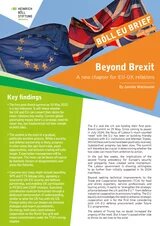Cable diplomacy: Securing influence, data and global rules
Subsea data cables are the digital lifelines of our modern world. Yet, external factors frequently expose vulnerabilities in the network and its supporting infrastructure. While around 150 cable faults occur globally each year, states suspect a growing number of cable faults to be linked to hybrid or malicious activity. Recognising that many states around the world face similar risks, the EU Action Plan on Cable Security proposes to establish “an advanced cable diplomacy”. But cable diplomacy is not a one-size-fits-all strategy. Technological sensitivities, dual-use aspects and geopolitical considerations demand a tailored approach. Where and how should the EU build effective cable diplomacy partnerships?






















